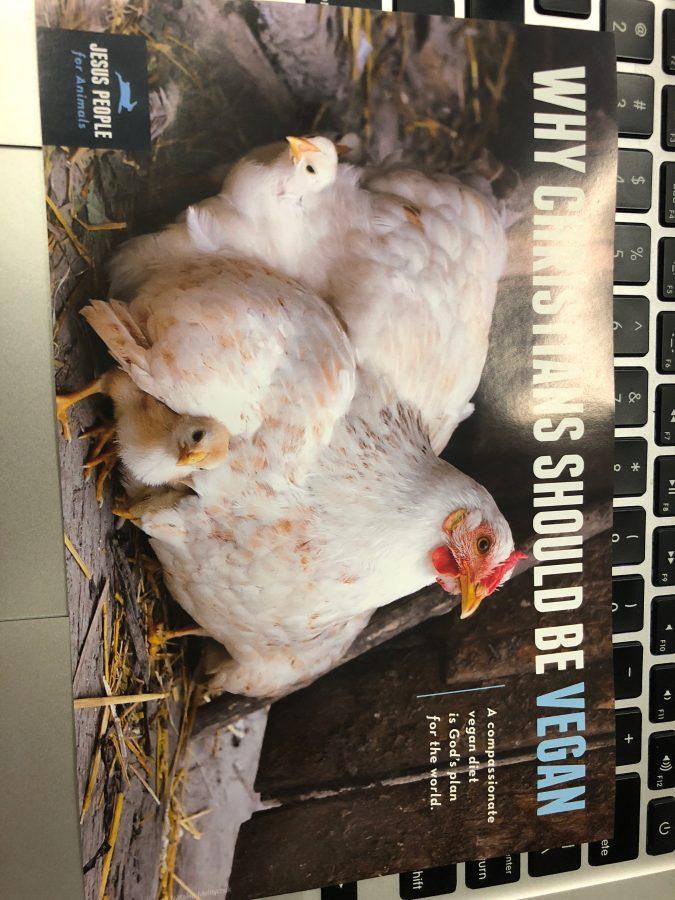When war with North Korea seems like a possibility, it’s easy to stop focusing on issues that don’t make as much of a splash. Nonetheless, it strikes me that being part of a democracy means caring about everything a little bit.
So how ‘bout those “Why Christians Should be Vegan” flyers? You may have seen them and steered clear of their bold, block lettering asking you to consider the imperatives of your (and also very possibly *not* your) religion. But briefly setting aside the fact that this exhortation has been laid out solely for Christians (I’ll get back to that later), the root question is worth asking—are the United States and global food industries so cruel that we should all reject it by becoming vegan?
First, vegans are people who do not eat animal products. If you’re new to the term, it’s like they’re extreme vegetarians—they don’t eat meat but they also don’t eat eggs or butter or drink milk and so on. Additionally, some don’t buy real leather belts or even clothes made out of wool.
Unlike my qualms about a third world war, I find various points to agree with in the “Why Christians Should be Vegan” flyer. Do I believe animal cruelty is a systemic problem in the U.S. and global food industries? Yes, I certainly do. I’m also intrigued by this seeming union between Christians and activists. Christian activists? Yes, some of them have a conscience that extends beyond abortion rights. In general, I feel like more Christians acknowledging the earth is *not* made to be turned to garbage by humans is good.
I partly feel this way because I am a Christian. Deeply embarrassed by the placard-carrying “Repent or Hellfire” Christians who show up every now and again, I’m pretty happy to see Christians acknowledging a real social justice issue.
While I do agree with the basic values underlying the call to a vegan lifestyle, I also have some major questions for the Jesus People for Animals who produced the flyers.
Let’s start with that introductory video on petalambs.com. Watching the video, you get the idea that if we shouldn’t *eat* animals, we should *pet* animals.
I’m with my sister on this one. She calls people who adopt this approach to animals “bunnyhuggers.” Why? My sister has worked in a variety of zoos and wildlife sanctuaries for nearly 10 years. You know what she does almost all day? She feeds animals and cleans up their poop. That is 90 percent of legitimately taking care of animals. You know what less than .01 percent of that remaining 10 percent is? Petting, snuggling, and hugging animals. The other 8.99 percent is shoving medicine down animals’ unwilling throats and keeping them relatively clean. (Note: These percentages are approximate.)
Also, let’s think about audience. UMass Boston is an urban public university serving urban students. The average urban person’s relationship with animals is distant and sometimes very negative. I know I’m casting the net wide here; nonetheless, “othering” animals is *real.* Bees, German Shepherds, even birds and squirrels can become the enemy when you do not spend a lot of time around them. When they are suddenly invading your space and everyone else you know freaks out when they show up, it’s hard to like them. It would be one heck of a challenge to make urban college students into bunnyhuggers.
I’m not going to lie, though, the thing that gets me the most is “using” the Bible to back this up. Let’s face it, the Bible has been used to legitimize every horrible thing from slavery to restricting women to electing Trump. The belief that “a compassionate vegan diet is God’s plan for the world” is relatively benign by comparison, but it’s still using scripture to prescribe a very specific lifestyle choice. Frankly, this one just doesn’t hold up. Take a look at Acts 10 when the early church makes the choice to abandon Levitical restrictions on food as immutable law. It’s “more what you’d call ‘guidelines’ than actual *rules*” now, as Captain Barbossa once said.
If you can’t do vegan but still care about what the Jesus People care about, here are some other ways to democratically participate in the issues:
1. Advocate to change the system. Check out the film Temple Grandin.
2. Spend time just watching animals. I’m serious. Not petting, not playing. Appreciate them the way they are. I hope this is a particularly useful strategy for those of you who think you hate animals or get really freaked out by them.
3. Request humanely produced food items at your grocery store. We live in a consumer-driven capitalist society (particularly under the current presidential administration), and making these kinds of requests actually makes a difference.
A Democratic Discussion about the ‘Christians Should be Vegan’ Flyers
April 4, 2018





















































